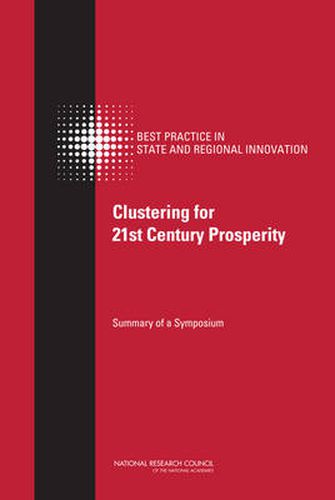Readings Newsletter
Become a Readings Member to make your shopping experience even easier.
Sign in or sign up for free!
You’re not far away from qualifying for FREE standard shipping within Australia
You’ve qualified for FREE standard shipping within Australia
The cart is loading…






Responding to the challenges of fostering regional growth and employment in an increasingly competitive global economy, many U.S. states and regions have developed programs to attract and grow companies as well as attract the talent and resources necessary to develop regional innovation clusters. These state and regionally based initiatives have a broad range of goals and increasingly include larger resources commitments, often with a sectoral focus and often in partnership with foundations and universities. Recent studies, however, have pointed out that many of these efforts lack the scale and the steady commitment needed for success. This has prompted new initiatives to coordinate and concentrate investments from a variety of federal agencies to develop research parks, business incubators, and other strategies to encourage entrepreneurships and high-tech development in the nation’s regions. Understanding the nature of innovation clusters and public policies associated with successful cluster development is therefore of current relevance.
Clustering for 21st Century Prosperity identifies best practices with regard to goals, structures, instruments, modes of operation, synergies across private and public programs, funding mechanisms and levels, and evaluation efforts. The committee, under the Board on Science, Technology, and Economic Policy (STEP) is reviewing selected state and regional efforts to capitalize on federal and state investments in areas of critical national needs. This review includes both efforts to strengthen existing industries as well as specific technology focus areas such as nanotechnology, stem cells, and advanced energy in order to better understand program goals, challenges, and accomplishments.
As part of this study, the committee is convening a series of public workshops and symposia involving responsible local, state, and federal officials and other stakeholders. Drawing from discussions at these symposia, fact-finding meetings, and commissioned analyses of existing state and regional programs and technology focus areas, the committee will subsequently produce a final report with findings and recommendations focused on lessons, issues, and opportunities for complementary U.S. policies created by these state and regional initiatives.
$9.00 standard shipping within Australia
FREE standard shipping within Australia for orders over $100.00
Express & International shipping calculated at checkout
Responding to the challenges of fostering regional growth and employment in an increasingly competitive global economy, many U.S. states and regions have developed programs to attract and grow companies as well as attract the talent and resources necessary to develop regional innovation clusters. These state and regionally based initiatives have a broad range of goals and increasingly include larger resources commitments, often with a sectoral focus and often in partnership with foundations and universities. Recent studies, however, have pointed out that many of these efforts lack the scale and the steady commitment needed for success. This has prompted new initiatives to coordinate and concentrate investments from a variety of federal agencies to develop research parks, business incubators, and other strategies to encourage entrepreneurships and high-tech development in the nation’s regions. Understanding the nature of innovation clusters and public policies associated with successful cluster development is therefore of current relevance.
Clustering for 21st Century Prosperity identifies best practices with regard to goals, structures, instruments, modes of operation, synergies across private and public programs, funding mechanisms and levels, and evaluation efforts. The committee, under the Board on Science, Technology, and Economic Policy (STEP) is reviewing selected state and regional efforts to capitalize on federal and state investments in areas of critical national needs. This review includes both efforts to strengthen existing industries as well as specific technology focus areas such as nanotechnology, stem cells, and advanced energy in order to better understand program goals, challenges, and accomplishments.
As part of this study, the committee is convening a series of public workshops and symposia involving responsible local, state, and federal officials and other stakeholders. Drawing from discussions at these symposia, fact-finding meetings, and commissioned analyses of existing state and regional programs and technology focus areas, the committee will subsequently produce a final report with findings and recommendations focused on lessons, issues, and opportunities for complementary U.S. policies created by these state and regional initiatives.